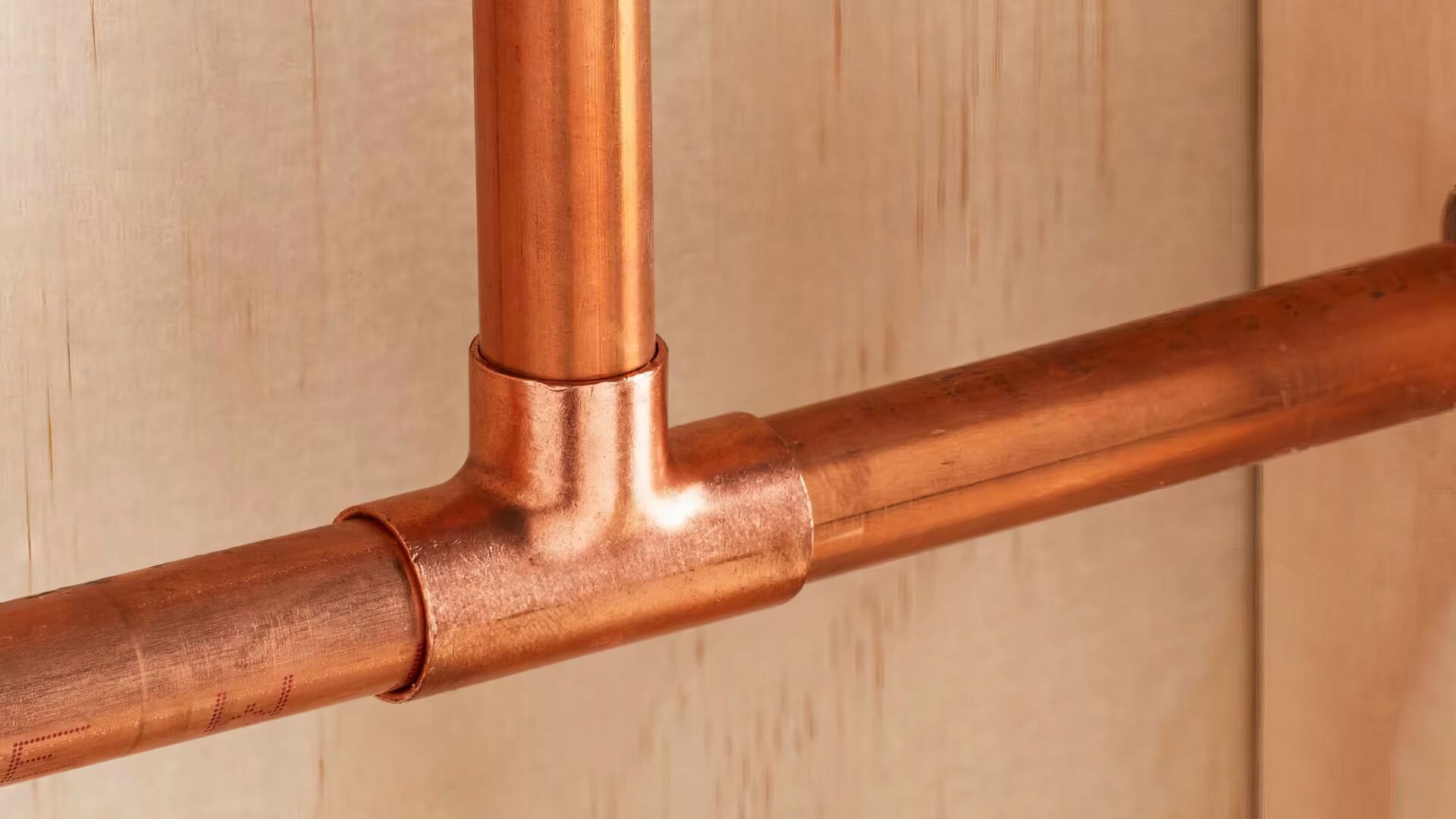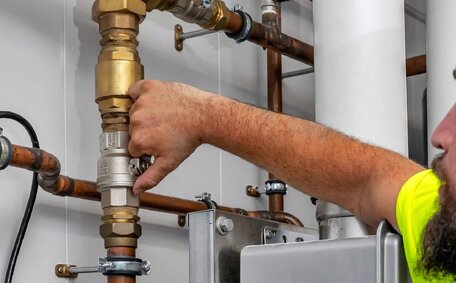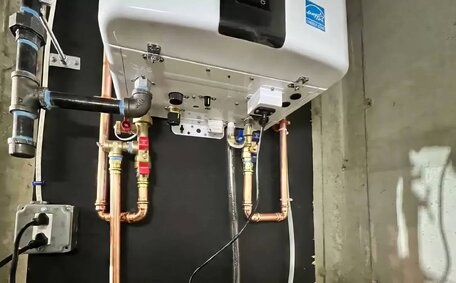Introduction to Off-Grid Hot Water Systems
Using a solar hot water system enables self-sufficiency by eliminating dependence on public utilities such as electricity, gas, or water. When it comes to hot water, an off-grid lifestyle presents unique challenges, as traditional type water heating methods, unlike solar water heating, typically require connection to electricity or gas networks.
Considering the geographical context of Epping, Sydney, we’ll assess realistic technologies which can use practical solutions, hot water energy efficiency and upfront costs.
We’ll be examining thermal water heating systems, including solar hot water systems, heat pumps, and wood-fired boilers. For each method, we’ll weigh up the pros and cons and examine how factors like climate, usage needs and budget play their part. This guide aims to aid in the selection of reliable and renewable off-grid hot water systems that suit your home’s needs.
Evaluating Different Off-Grid Hot Water Options
For off-grid living, there are several primary options to secure hot water without conventional electricity or gas utilities:
Solar Water Heaters
Solar water systems utilise solar panels and thermal collectors to channel the sun’s heat into your water supply. There are two main systems suitable for off-grid use:
- Evacuated tubes systems - Highly efficient but relatively expensive. Made of rows of glass tubes containing vacuum sealed copper pipes inside. Water through the pipes flows efficiently, absorbing solar energy for optimal water heat.
- Flat panel systems - Less expensive but slightly less efficient than evacuated tube systems. Made of an insulated, weatherproof box containing copper pipes or absorber plates which heat up when sunlight shines on them.
Your hot water system operates optimally with bright sunshine, This guarantees maximum heat absorption. These systems are compatible with off-grid solar technology in your area’s climate, like Epping, and with options to reduce your booster usage, ensure hot water on cloudy days or at night. They carry low ongoing costs but upfront purchase and installation costs can be high, nonetheless, there are economical options out there with the benefit of saving on your electricity bill.
Wood-Fired Boilers
Wood-fired water heating systems are energy efficient and can use logs, wood pellets, or chipped biomass to warm water in an integrated hot water tank efficiently. They can serve as a solar hot water heater in areas where heating water to 60-80°C entirely off the grid is essential. This eco-friendly and cost-effective solution provides a sustainable heating alternative to fossil fuels in wood-rich regions.
LPG or Natural Gas Systems
While not fully renewable, LPG or natural gas-powered gas heaters circumvent the need for grid energy and act as an effective off-grid heating system. The use of gas power enables instant water heating on demand, supplementing renewable energy solutions in off-grid environments. A portable hot water heater can, featuring electric ignition, be well-suited for small-scale off-grid applications. Installing off-grid natural gas systems requires a fixed gas line, yet offers a continuous hot water supply, integral to a self-sufficient energy mix.
Heat Pumps
Heat pumps like the Stiebel Eltron Acculink work by extracting latent heat from the surrounding air. These systems harness solar power to concentrate thermal energy, quickly heating water with minimal electricity use. Despite the higher initial cost, heat pumps are remarkably energy-efficient in operation.
When weighing up off-grid water heaters, Consider your local climate, hot water needs, usage patterns, fuel availability, and budget. A solar-gas hybrid system tends to yield the best solution in terms of reliability and cost-effectiveness for off-grid homes in temperate regions like Sydney.
Wood-Fired Wetback Systems
Wood-fired wetback systems enable water heating using an existing wood stove or heater as the energy source. These hot water systems present a way heat can be transferred from the firebox of your wood stove into the connected water tank via a built-in heat exchanger.
The key benefit is that when your wood heater is in use, you’re simultaneously heating water with high efficiency. If you already run a wood stove during the winter months, wetback systems allow you to maximise the appliance’s usefulness in heating both space and water. Wetback systems can contain a storage tank from 120 to 300 litres and are ideal for small-scale off-grid homes.
Important considerations for wood-fired wetback systems:
- Requires you to run your wood stove regularly to provide consistent hot water. If not run daily, hot water supply can be interrupted.
- You need ready access to firewood – so best suited to areas with abundant wood resources like acreages or bush settings.
- Output is dependent on stove heating patterns – similar to solar, a booster electrical element may be needed to guarantee supply.
Using local waste wood or salvaged heat from an existing heater, wood-fired water heating can be an exceptionally sustainable choice. An eco-friendly option tailored to appropriate off-grid situations.
LPG Hot Water Systems
LPG (or liquefied petroleum gas) heaters can allow for an off-grid supply of continuous hot water without relying on electricity or solar power. They run on bottled LPG which is delivered in high-pressure gas cylinders.
There are two main types of LPG systems:
- Storage tank setups serve as a cornerstone for an off grid hot water system, maintaining a well-insulated vessel where water heated to the desired temperature is kept ready for use. Hot water tanks can hold around 300 litres and provide water at 50-60°C. Storage units can be used effectively off-grid and might use gas burner mechanisms that come with built-in or external features to efficiently heat water.
- Instantaneous systems work swiftly to provide hot water precisely when it’s required. They have a gas burner that ignites as you turn on a hot tap, providing a continuous supply without needing a storage reservoir.
Instantaneous LPG systems are more energy-efficient than conventional grid-connected solutions due to the elimination of heat loss from stored pre-heated water.
They provide climate resilience as water is heated onsite. However, it’s important to note that LPG hot water systems do produce carbon emissions.
Our Epping plumbers can advise on safety standards and help select suitable LPG hot water units for your specific off-grid requirements.
Solar Thermal Hot Water Systems
A solar power system known as solar thermal hot water systems uses solar energy to heat water. There are two main components:
- Solar collectors (either flat plate or evacuated tube) that harness heat from sunlight
- An insulated storage tank that holds the heated water
Radiation from the sun elevates the temperature of the fluid within the solar collectors, which then communicates its heat to the electric water held in the adjoining storage tank. This preheated water feeds directly into the system your hot household uses for hot water needs. In a temperate climate like Sydney, solar thermal systems can meet 50-90% of household hot water demand.
Benefits of solar thermal technology for off-grid hot water include:
- Uses free, renewable solar energy - reducing emissions and fuel costs
- Evacuated tube models can achieve over 300L of hot water per day
- Durable components with a lifespan of 15-20 years
- Low maintenance apart from occasional collector cleaning
Consider pairing a solar water heater with an electric boost or pump solar backup for cloudy conditions. Moreover, correct orientation is key; north-facing panels at 30 to 50 degrees optimise solar exposure in Australian conditions.
Heat Pump Hot Water Systems
Heat pumps employ heat extraction technology for an efficient and environmentally-friendly off-grid water heating solution. Heat pumps use a vapour compression cycle to extract latent heat from ambient air and concentrate it to heat water.
Key benefits of off-grid heat pump water heaters include:
- Touted as the most efficient option, heat pumps can generate 2-3 times more heat energy than the electrical energy they use. This efficiency translates to heating water with minimal solar or battery power.
- Effective even in remote areas without mains grid connections. Heat pumps will supply your water needs with hot water year-round, provided ambient temperatures stay above 5°C.
- Compact, quiet and safe to run. Smaller than solar thermal systems.
- Lower greenhouse emissions compared to gas or wood-fired heating.
Quality heat pump models for off-grid use include the Steibel Eltron Acculink and Sanden Eco Plus. Upfront cost is their main downside.
Coupled with a solar PV and battery storage system, heat pumps offer a reliable, renewable energy solution for hot water in environmentally conscious homes. The efficiency of hot water heat pumps makes them one of the best hot water technologies for temperate off-grid climates.
Installing and Maintaining Off-Grid Hot Water Systems
Proper installation is key to ensuring your off-grid hot water system functions reliably for years to come. When installing any system:
- Engage a licenced plumber and electrician to assure your solar system complies with all relevant regulations.
- Select the optimal location with good solar access, ventilation and structural support.
- Size the system capacity to meet your household’s peak hot water requirements.
- Include a temperature/pressure relief valve and other safety features.
Solar thermal systems need occasional cleaning to remove grime that impedes solar absorption. Heat pumps and gas systems may need minor anode rod replacements every 5-8 years. Wood-fired boilers need ash removal and cleaning.
It’s advisable to schedule annual servicing by a specialist such as Epping Plumbing to ensure optimal functionality. Preventative maintenance prevents more costly repairs down the track.
Sizing and Selecting System Components
Choosing the right sized hot water system is crucial for off-grid living situations. Your hot water usage patterns determine the necessary system capacity, along with household occupancy rates and peak demand periods.
As a general guide, in temperate regions like Sydney a typical 3-4 person household requires:
- 160-250L gas or electric storage tank
- 200-300L solar storage capacity
- A 2-3kW heating element for electrical boosting
However an accurate hot water sizing calculation depends on:
- Your daily hot water consumption
- Preferred water temperature and flow rate
- Allowance for future demand increases
- Hours of peak use and simultaneous draws
Installation and Integration Considerations
When installing a new off-grid hot water system, proper site selection and integration with your existing utilities is crucial. Consider factors like:
- Solar access - Ensure solar collectors have full sun exposure, ideally in a north-facing position without shade.
- Ventilation - Gas and wood-fired systems require good airflow for combustion and exhaust flueing.
- Water connections - Storage tanks should be uphill of household outlets fed by gravity. Minimise pipe runs for efficiency.
- Load-bearing capacity - Verify that the building structure can support the weight of rooftop solar systems or water tanks.
- Electrical integration - Solar thermal pumps and gas ignition components may require wiring into battery banks with a charge controller or PV systems by a skilled electrician.
Consider plumbing codes and sustainability ratings such as NatHERS when selecting system components and parameters. We recommend consulting licenced tradespeople early in your off-grid hot water project to ensure safe, compliant installation and integration.
With thoughtful planning and expert help as needed, your DIY off-grid system can operate reliably just like conventional grid-connected infrastructure. The Epping Plumbing team specialises in customising DIY solar hot water solutions for off-grid and eco-friendly households.
Maintenance and Troubleshooting
Regular maintenance ensures there no disruptions in keeping your off-grid hot water system running optimally long-term. This mainly involves:
- Inspecting and cleaning solar collectors 2-4 times per year to remove dirt or debris blocking sun absorption
- Checking gas burners and flues annually in gas systems, clearing any spider webs or buildup
- Replacing anode rods in electric storage tanks every 5 years to prevent corrosion
- Draining and flushing wood boiler heat exchangers yearly to prevent creosote accumulation
For troubleshooting the whole process of common issues:
- If solar output declines, check for collector damage, leakage, or absorption-blocking dirt
- Insufficient or intermittent hot water could indicate improperly sized components - consult our sizing guide
- Strange smells or noises point to potential vent blockages in gas systems needing immediate attention
- Wood-fired boilers prone to smoking or low output may have air intake problems
Don’t hesitate to phone the team at Epping Plumbing if you encounter any problems. We can assess issues and tailor solutions to keep your off-grid hot water running perfectly.
Choosing the Right Off-Grid Hot Water System
When selecting an off-grid hot water system in the Epping area, the most important factors to weigh up are:
- Climate and weather patterns - Systems like solar thermal rely heavily on sunny conditions, so assess historical meteorological data for your location.
- Budget - Check costs of purchasing components plus installation fees where necessary against your available funding.
- Ongoing fuel supply - Solar resources are abundant but wood or gas systems need fuel delivery and storage capacity.
- Energy efficiency and autonomy - Prioritise technologies like heat pumps that maximise water heating from minimal electricity use.
- Environmental goals - Some solutions align better with emissions reduction targets or sustainability principles.
No single solution fits all off-grid scenarios, as each situation is unique. The team at Epping Plumbing have the practical expertise to review your unique location, lifestyle needs and objectives, before tailoring a customised off-grid hot water system to suit.
Get in touch with us today to explore the possibilities - whether you want to embrace solar thermal technology, integrate wood-fired heating through a wetback, or simply make an existing system operate reliably off-grid. Our personalised approach delivers the right renewable hot water outcome for your home.






